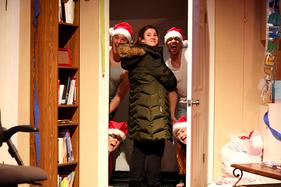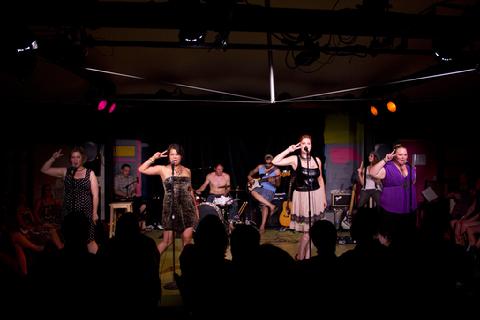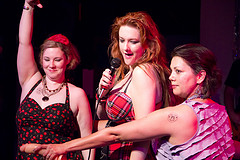|
Jacqueline Lawton: What was the first play that you ever directed? What did you learn from that experience that remains with you today?
Toni Rae Salmi: My first play was ‘Dentity Crisis by Christopher Durang my senior year in college. I learned to trust my instincts when it came to a myriad of things, but comedy and casting come to mind first. I also learned that in all actuality, the director does NOT have all of the power. There’s always someone with a bit more who might control some strings that you were not aware of. At that point, it was the faculty, but in later years, it’s your artistic director or producer that might have a final say in how a production goes. JL: Why did you decide to get into theatre? Was there someone or a particular show that inspired you? TRS: My story is not unique: I saw a play and thought to myself, “I can do that,” and proceeded to put myself out there. It came fairly naturally to me, at least the acting part, but it wasn’t until I was cast as Lady Macbeth in college did I realize that to be fully satisfied with your work onstage you REALLY had to do your homework. Looking back I wish that my school offered a “how to market yourself as a director” course, or took the time to focus on that. I went to a smaller school, and was on the academic track in grad school so I never learned how to do that; then again, I'm not sure if schools offer it. JL: What kind of work do you do to pay the bills? How do you balance this work with your work as a director? TRS: I oversee educational programs and research for a trade association in Northern Virginia. I have responsibilities and travel quite a bit, so it gets more challenging when my day job is busy. Getting a directing gig at the beginning of the year through early spring is ideal, because that’s the slow period for my day job, but it never seems to work out that way, and I still manage to pull it off! But as the years go by, I know there IS a balance you have to strike, so sometimes you have to say no. I say no more on the directing side unfortunately because I DO have to pay the bills. JL: In DC, we have the Capital Fringe Festival, the Intersections Festival, the Source Festival, the Kennedy Center's Page-to-Stage Festival, the Black Theater Festival, and the Hip Hop Theatre Festival. We also have the Mead Lab at Flashpoint Theater Lab Program. Have you participated in any of these? If so, can you speak about your experience? TRS: I have directed twice for Pinky Swear: the award-winning Cabaret XXX: Les Femmes Fatales and Cabaret XXX: Love the One You’re With. I also performed in both shows. First let me say I do not recommend this. I keep saying I won’t do it and then I get roped back in, but I am determined to not be swayed in the future. Your focus is too split and neither position gets the full attention it deserves. Anyway, since the shows were both so successful, my Fringe experience was great! Sure it was hot in the tent and the conditions were never ideal and we had to conform to strict set and light parameters, but once you are aware of those parameters, it’s such a fun atmosphere and such great audiences that all the challenges are easily forgotten, at least from a performance/production perspective. JL: How many plays have you directed in the DC area? How many of them were written by women? By playwrights of color? How conscious are you selecting plays by women or people of color when deciding your season? TRS: Both Fringe Cabarets could be categorized as devised pieces, with the focus entirely on the female experience. Carol’s Christmas was written by local female playwright Marni Penning. All of Pinky Swear’s plays have been written by women and I believe that won’t be changing too much in the future. JL: How do you feel the DC theatre community has addressed the issues of race and gender parity? How has this particular issue impacted you and your ability to work? TRS: As someone who is half-Filipino, I do identify as a person of color. I can only address what I know and that is that the Asian-American theatre folk are struggling to get some group back together; I hope to be a part of that when it happens. In regards to work, as an actor, I think it most definitely has impacted my ability to work, but as a director, I haven’t been doing it that much here so it really hasn’t affected me. JL: If you could be direct at any theatre in DC, which would it be and why? TRS: Taffety Punk! Because I k now and love them and know that I would get AMAZING performances from them. Plus, I like their style, their bravery and their “bring it to the people” attitude. A few years ago I might have named a bigger theatre, but that’s not where my head is these days. JL: DC audiences are ... TRS: A motley bunch and will surprise you. You cannot assume the stoney-faced grandma in the front row is not having a good time J JL: DC actors and designers are ... TRS: Hungry for more work and willing to do whatever you ask of them. JL: DC playwrights are ... TRS: Not recognized enough. JL: DC critics are ... TRS: Critics. And EVERYONE is a critic, so if you hate or can’t take criticism, you’re going to be a very unhappy person in this business. JL: What advice do you have for an up and coming DC based director or a director who has just moved to D.C.? TRS: There is something for everyone here. SEE EVERYTHING, then decide your path. Accept that you’re going to have to get a day job. I can count on one hand those theatre folk I know who don’t have a day job. And welcome to a friendly nurturing community! JL: What's next for you as a director? Where can we keep up with your work? TRS: Well, since I'm in a show with Hub Theatre this summer, I won’t be involved with Fringe, but more than likely I will be directing something for Pinky Swear next season. I haven’t really put myself out there for other companies but I would welcome the opportunity.
0 Comments
Your comment will be posted after it is approved.
Leave a Reply. |
My BlogI'm a playwright, dramaturg, and teaching artist. It is here where you'll find my queries and musings on life, theater and the world. My posts advocate for diversity, inclusion, and equity in the American Theatre and updates on my own work. Please enjoy!
Categories
All
Archives
June 2020
Reading List
|



